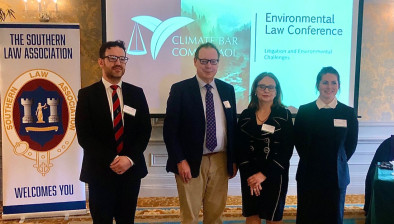High Court: Decision to amend waste discharge licence was ultra vires the powers of the Environmental Protection Agency
An environmental activist has been granted a declaration that the Environmental Protection Agency acted ultra vires its powers in 2017 when it granted Irish Water a technical amendment to a licence granted in 2012, which effectively allowed it to regularise ongoing breaches to the licence conditions.

About this case:
- Citation:[2019] IEHC 81
- Judgment:
- Court:High Court
- Judge:Mr Justice Garrett Simons
Criticising the agency for conjuring up “a doomsday scenario” whereby the technical amendment was necessary to avoid the town of Youghal being evacuated, Mr Justice Garrett Simons said that the correct response would have been to make an application to revise the licence which would have required public participation.
Background
The proceedings brought by Mr Peter Sweetman concern the regulation of the discharge of waste water from the combined sewer network of Youghal, County Cork.
The Waste Water Discharge (Authorisation) Regulations 2007 (S.I. No. 684 of 2007) obliged local authorities to apply for a waste water discharge licence.
The prescribed deadline for the making of an application in the case of agglomerations – such as Youghal – was 22 September 2008. In or about 22 September 2008, Cork County Council (Southern Division) applied for a waste water discharge licence for Youghal.
The development of the WWTP required a number of other development consents, including certification pursuant to Article 123 of the Local Government (Planning & Development) Regulations 1994 – this was issued in March 2002.
An environmental impact statement (EIS) had been submitted to An Bord Pleanála as part of the planning certification process, and the EIA was furnished to the EPA in 2008 in accordance with the 2007 Regulations.
Primary discharge point
When the licence application was made in 2008, untreated waste water was being discharged directly into the estuary from a number of points. It was proposed that once the WWTP was completed, there would then be a new primary discharge point to be located at Ferry Point, and that following the completion of works, effluent would be treated effectively prior to discharge.
Ferry Point was chosen as a discharge point because it was the most “environmentally and economically suitable location”, that the location “would provide significant volumes of water to dilute the effluent, even at low tide, and due to increased currents at this location would provide good mixing and dispersion in the receiving waters”, and that this would “reduce emissions into the Natura 2000 sites”. The licence was granted in 2012.
When the licence application was made in 2008, it was intended that the WWTP would be completed by December 2015, however it was not completed until December 2017.
In February 2017, Irish Water applied to the EPA for a technical amendment to the 2012 licence under regulation 33(c) of the 2007 Regulations. The application was successful, and the technical amendment was issued under the seal of the EPA on 22 May 2017.
One of the principal changes authorised by the technical amendment in 2017 was to allow a different discharge point to be used as the primary discharge point from the newly commissioned WWTP on a temporary basis.
Regulation 33
In the High Court, the dispute centred on whether it was lawful for the Environmental Protection Agency to amend the existing licence by way of a technical amendment (under regulation 33 of the 2007 Regulations), or, alternatively, whether the EPA was required to comply with the procedure for the revision of a licence (under regulation 14).
Mr Justice Simons pointed out that only the latter procedure triggered any requirement for public participation.
On behalf of Mr Sweetman, it was submitted that, inter alia, an amendment seeking to authorise an ongoing breach of a licence cannot be said to be facilitating the operation of the licence (as per regulation 33(c)). The ongoing breaches were identified as the failure to complete the WWTP by December 2015 or have Ferry Point as the primary discharge point as required by the licence conditions.
Counsel for the EPA submitted, inter alia, that the 2012 licence authorises discharges subject to certain parameters, changes the points at which the discharges are made to be made once the WWTP is commissioned, and that there was no requirement to cease the discharge of untreated water as of December 2015.
Mr Justice Simons pointed out that the CJEU had recently emphasised the importance of public participation in respect of both the Water Framework Directive and the Habitats Directive. In particular, the CJEU indicated that the Directives should be read in the light of the Aarhus Convention on public access to information, public participation in decision-making, and access to justice in environmental matters.
Mr Justice Simons was also satisfied that the precise purpose of requiring the completion of the WWTP by December 2015 was to ensure the treatment of the waste water, and that the location of the discharge point was seen as a matter of some importance in the context of the licence application. He said it was clear the licence was ‘not neutral on the question of where the discharge occurs provided that the emission limit values are met’, and accepted that regulation 33(c) could not be relied upon to regularise an ongoing breach of a licence condition.
Criticising the EPA for conjuring up “a doomsday scenario whereby—but for the technical amendment—the continued discharge of waste water from Youghal might have had to be discontinued and the town evacuated”, Mr Justice Simons said that the correct response to delays in the project would have been to make an application to revise the licence pursuant to regulation 14.
In all the circumstances, Mr Justice Simons concluded that the EPA acted ultra vires in purporting to amend the licence by way of a technical amendment – as such, he granted a declaration that the EPA’s decision of 22 May 2017 was ultra vires the powers of the EPA.
- by Seosamh Gráinséir for Irish Legal News










